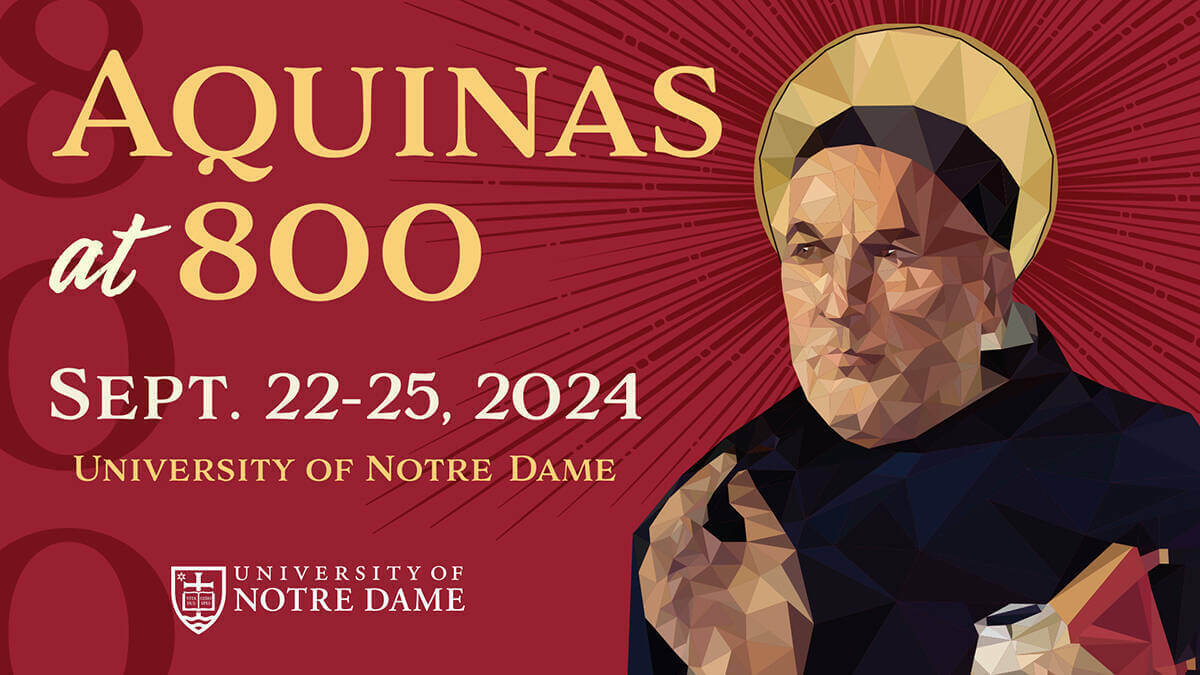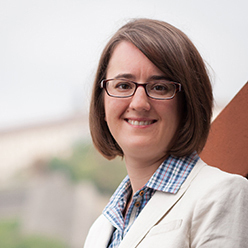Notre Dame to host conference on St. Thomas Aquinas, commemorating 800th anniversary of his birth

For centuries, the work of St. Thomas Aquinas has informed academic inquiry into issues of human dignity, freedom, economic development, work, poverty, the environment and other matters of global significance.
To commemorate the 800th anniversary of his birth, the University of Notre Dame will host a conference Sunday through Wednesday (Sept. 22-25) celebrating Aquinas’ enduring importance to contemporary cultural, philosophical and theological discussions.
“Aquinas at 800: ‘Ad multos annos’” will be the largest conference of its kind, with more than 500 in-person attendees and more than 150 speakers.
Those interested in participating may also register to attend via Zoom.

The event offers people who may have preconceived notions about Aquinas a chance to take another look, said Therese Cory, the John and Jean Oesterle Associate Professor of Thomistic Studies, the director of the Jacques Maritain Center and one of the event’s organizers.
“If they thought he wasn’t relevant anymore, this conference might offer them reason to think, ‘Wow, his thought is still flourishing and able to help us think through the problems that we have today,’” Cory said. “They’ll have a chance to see how wide and expansive his work really is.”
The conference will begin at 4 p.m. Sunday with an opening Mass at the University’s Basilica of the Sacred Heart. Rev. Kevin Grove, C.S.C., an associate professor of theology, will serve as celebrant.
Three esteemed faculty members from the Pontifical University of Saint Thomas Aquinas in Rome will present at the conference. Rev. Serge-Thomas Bonino, O.P., the dean of the faculty of philosophy and president of the Pontifical Academy of Saint Thomas Aquinas, and Rev. Thomas Joseph White, O.P., the university’s rector magnificus, will each offer a keynote address. Fr. Wojciech Giertych, O.P., a theologian of the Papal Household and professor of moral theology, will offer opening remarks.
A concluding Mass will be held at 5:15 p.m. Wednesday in the Basilica.
One of Aquinas’ most enduring and important contributions is his ability to bring together concepts that often appear to be in conflict, Cory said, such as faith and reason or human embodiment as flesh-and-blood creatures and human transcendence in communion with God.
“Holding those two dimensions at the same time has always been a challenge for philosophers, and for Aquinas, it informs everything he has to say about who we are as human beings,” Cory said. “I think that’s a crucial lesson for us today, because in our society we have a tendency to emphasize materialistic pleasures and consumerism at the expense of our more transcendent, spiritual needs. At the same time, we are in danger of over-abstractifying our lives as humans — communicating through screens and phones, living in an abstract space in our minds — and forgetting that we are embodied creatures.”
Likewise, Aquinas saw science and religion not as separate realms, but as deeply connected, Cory said. “Our scientific endeavors and our thinking about God have to be able to come together into a single space where we’re able to think and reason and talk with other people about what we’re learning and learn from them as well. Aquinas provides us with a model for a harmonious relationship between faith and reason.”
As a Catholic research institution, Notre Dame takes all branches of knowledge seriously — faith and reason, theology and philosophy, and religion and science — making the University an ideal choice to host this flagship event, Cory said.
“Notre Dame is also one of the best places in the world to do medieval philosophy research,” she said. “We have an incredibly strong community in philosophy and theology who work on medieval figures, and particularly on the thought of Aquinas. So, it made sense for us to take the lead in organizing this. We are thrilled to host what will be the largest gathering of scholars celebrating Aquinas during this anniversary year.
“And for our Notre Dame students, the conference allows them to see the sheer number of people who are working on Aquinas and the variety of disciplines, locations and institutions they represent. It lets students see that when they’re studying Aquinas, it’s not just an item on a syllabus — they’re part of this community, too.”
Originally published by at news.nd.edu on September 17, 2024.
Latest Research
- Megan McDermott joins ND–IBM Tech Ethics Lab as new Notre Dame directorThe Notre Dame–IBM Technology Ethics Lab, a critical component of the Institute for Ethics and the Common Good (ECG) and the Notre…
- Jenkins Center for Virtue Ethics receives grant to advance love-based ethical frameworkThe University of Notre Dame has received a $10 million grant from the John Templeton Foundation to support a project titled Love and Social Transformation: Empowering Scholars and Social Innovators to Develop the Love Ethic.
- ND-GAIN releases latest Country Index updateThe lastest update to the University of Notre Dame’s Global Adaptation Initiative's (ND-GAIN) Country Index is now live. The ND-GAIN team will release a second Country Index update in late Fall, which includes…
- In sub-Saharan Africa, 1 in 6 cancer medications found to be defectiveSerious quality defects were found in a significant number of cancer medications from sub-Saharan Africa, according to new research from the University of Notre Dame.
- Belfast conference honors legacy of Irish art historian S.B. KennedyMore than 80 people gathered at the Ulster Museum and Queen’s University Belfast on May 22-23 for the conference “New Histories of Irish Art and Modernism.”
- From giving a TEDx Talk to starting a sustainability initiative, one student’s transformational experience in Hong KongWhen Bernice Antoine decided to do a semester abroad in Hong…













